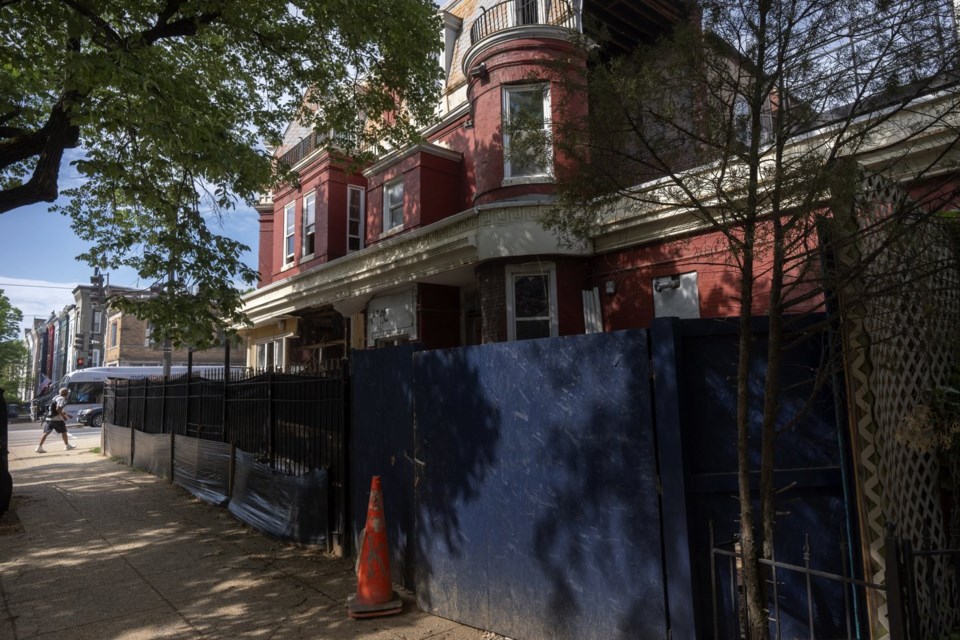WASHINGTON (AP) — When President Donald Trump directed his attorney general last month to investigate online fundraising, he cited concerns that foreigners and fraudsters were using elaborate “schemes" and “dummy accounts” to funnel illegal contributions to politicians and causes.
Instead of calling for an expansive probe, however, the president identified just one potential target: ActBlue, the Democrats’ online fundraising juggernaut, which has acknowledged receiving over 200 potentially illicit contributions last year from foreign internet addresses.
Trump’s announcement also contained a glaring omission — his own political committees have received scores of contributions from potentially problematic donors.
The White House did not respond to questions about Trump's fundraising. Instead, a senior administration official pointed to a recent House Republican investigation of ActBlue, which the White House alleges “uncovered specific evidence of potentially unlawful conduct.”
The Justice Department did not respond to a request for comment.
Here are some takeaways from the AP's review of Trump's political committees:
Trump's committees received questionable donations from overseas
It’s against the law for U.S. candidates and political committees to accept contributions from foreign nationals. Laws also place strict limits on donation amounts and prohibit the laundering of contributions to get around legal caps. For the most part, such donations have been policed by campaigns and the Federal Election Commission, with only the most egregious examples being targeted by federal law enforcement.
The AP identified only two Trump donors out of more than 200 living abroad whose U.S. citizenship was listed as “verified” in the president’s campaign finance reports. He received over 1,000 contributions from 150 donors who omitted key identifying details such as their city, state, address or country. Trump also received at least 90 contributions from people who omitted their full name, are listed as “anonymous” or whose donations include the notation “name not provided.”
Many of them were made through WinRed, the Republicans’ online fundraising platform that is the GOP’s answer to ActBlue.
Campaign finance disclosures indicate that only a few dozen of these contributions were later refunded. WinRed officials did not respond to a requests for comment.
Some of the donations would typically raise red flags
U.S. citizens living abroad are free to donate to politicians back home. But it can be difficult even for campaigns to discern who is allowed to give and whether a person may be serving as a “straw” donor for someone else.
Jiajun “Jack” Zhang, for example, is a jet-setting Chinese businessman whose Qingdao Scaffolding Co. boasts of being one of the “biggest manufacturers and suppliers in China” of scaffolding. In October, he used WinRed to donate $5,000 to Trump, campaign finance disclosures show.
Zhang lives in China’s Shandong province, according to his LinkedIn account, and is described in French business filings as a Chinese national. But his contribution to Trump lists a La Quinta Inn in Hawaiian Gardens, California, as his address, records show. The donation was made around the time that Zhang posted a photo on social media of his family visiting Disneyland, which is near the hotel.
Zhang did not respond to an email seeking comment.
Other potentially troublesome donations identified by the AP include four from unnamed donors that listed an address of “999 Anonymous Dr.” And a series of contributions made through WinRed that listed the donor’s address as a vacant building in Washington that was formerly a funeral home. The donor, identified only as “Alex, A” on Trump’s campaign finance report, gave nearly $5,000 spread across more than 40 separate transactions last year.
Trump has never cared much about campaign finance violations
The donations fit a pattern for Trump, who has in the past exhibited indifference toward campaign finance rules and used his presidential powers to assist those facing legal trouble in such matters.
In January, Trump’s Justice Department dropped its case against former Rep. Jeff Fortenberry, a Nebraska Republican accused of accepting a $30,000 contribution from a Nigerian billionaire. During his first term, Trump pardoned conservative commentator Dinesh D’Souza and Republican donor Michael Liberty, who were both convicted of using straw donors to evade contribution limits. He also pardoned former California Rep. Duncan Hunter, who was convicted in 2020 of stealing $250,000 from his campaign fund.
Trump’s political efforts have also drawn contributions from straw donors and foreigners who have subjected to legal scrutiny.
Among them is Barry Zekelman, a Canadian steel industry billionaire, who was fined $975,000 in 2022 by the Federal Election Commission for funneling $1.75 million to America First Action, Trump’s official super PAC, in 2018. The contribution helped Zekelman secure a dinner with Trump at which steel tariffs were discussed.
Democrats are nervous about the investigation
Democrats are outraged by the call for an investigation. They say it smacks of political retribution, considering WinRed has also accepted potentially problematic donations.
“This is him taking direct aim at the center of Democratic and progressive fundraising to hamstring his political opponents,” said Ezra Reese, an attorney who leads the political law division at the Elias Law Group, a leading Democratic firm that does not represent ActBlue. “I don’t think there’s any question that they picked their target first. He’s not even pretending.”
But Democrats are also worried. Some predict a hit worth as much as a $10 million in the short term if ActBlue is forced to shut down. That has led some Democrats to begin thinking about alternatives, though they acknowledged it might be too late to create something as successful as ActBlue with the midterms around the corner.
“There is a pervasive fear that ActBlue could cease to exist,” said Matt Hodges, a veteran Democratic operative who served as the director of engineering for Joe Biden’s 2020 campaign. “That’s the worst fear people have — that this will escalate or drain legal resources that hinder their ability to operate.”
—-
Peoples reported from New York.
__
Contact AP’s global investigative team at [email protected] or https://www.ap.org/tips/
Brian Slodysko And Steve Peoples, The Associated Press



